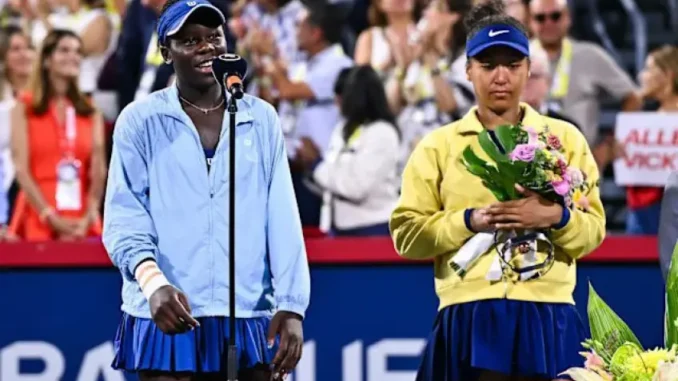
In the vibrant heart of Montreal, the 2025 National Bank Open women’s final unfolded as a clash of generations, pitting four-time Grand Slam champion Naomi Osaka against 18-year-old Canadian wildcard Victoria Mboko. The match, a thrilling display of resilience and raw talent, saw Osaka seize an early lead only to falter as Mboko stormed back to claim her maiden WTA 1000 title with a 2-6, 6-4, 6-1 victory. Yet, it was Osaka’s actions post-match—a brief, emotionally charged speech that omitted congratulations to her opponent—that sparked a firestorm of criticism, branding her “disrespectful” and “not classy.” As the tennis world dissects the incident, Osaka’s candid reflections reveal a player grappling with the weight of defeat and the pressures of her comeback.
Osaka, 27, entered the final chasing her first WTA Tour title since the 2021 Australian Open, a milestone that would cap a remarkable resurgence. Her journey to the Montreal final, her first WTA 1000 championship match since 2022, was a testament to her enduring brilliance. After a 15-month hiatus for maternity leave following the birth of her daughter Shai in July 2023, Osaka had battled back, overcoming third-round losses at the Australian Open and Wimbledon, and a first-round exit at the French Open. In Montreal, she dispatched formidable opponents, including 16th seed Clara Tauson in a 6-2, 7-6(9) semifinal, saving two set points in a nail-biting tiebreaker. “Definitely really happy,” Osaka said after reaching the final, her eyes set on a seeding at the upcoming US Open. Her dominant first set against Mboko, a 6-2 rout fueled by two breaks of serve, showcased the power and precision that once made her world No. 1.
Mboko, a Toronto native born to Congolese parents, was the hometown hero whose meteoric rise captivated the packed Centre Court. Ranked No. 85 and starting 2025 outside the top 300, she stunned the tennis world by defeating four Grand Slam champions—Sofia Kenin, Coco Gauff, Elena Rybakina, and now Osaka—en route to the title. Despite a swollen wrist, injured during a fall in her semifinal against Rybakina, Mboko battled through pain, converting eight of nine break points in the final. “It feels unbelievable right now,” she told the roaring crowd, adding in French, “Montreal, je vous aime!” Her resilience shone in the third set’s pivotal fourth game, where she saved four break points with a daring drop shot, securing a 4-1 lead she never relinquished. “When I had that winning moment and seeing so many people standing up and cheering for me, it was kind of a surreal experience,” Mboko said, her joy palpable as she joined Faye Urban (1969) and Bianca Andreescu (2019) as the only Canadians to win the home event in the Open Era.
Osaka’s unraveling in the second and third sets, marked by 22 unforced errors and six of 13 break points converted, left her visibly devastated. The partisan crowd’s fervor, occasionally crossing into disruption with cheers during her serves, added to the pressure. When the time came for her runner-up speech, Osaka’s words were brief and tinged with frustration: “Thanks, I guess. I don’t really want to take up too much time. I’ll just say thank you to everyone. Thank you to my team, the ball kids, organizers, and volunteers. I hope you guys had a good night.” Her failure to acknowledge Mboko, who had cited Osaka as her childhood idol, drew swift backlash. “That was such poor form by Osaka not congratulating Mboko,” one fan remarked online, while another called it “a total lack of professional etiquette.” Australian doubles star Ellen Perez appeared to take a veiled jab, noting that “some women should take notes” from players who handle defeat graciously.
In a delayed press conference, Osaka addressed the controversy, her voice heavy with regret. “I think it’s kind of funny. This morning I was very grateful. I don’t know why my emotions flipped so quickly, but I’m really happy to have played the final,” she said. “I think Victoria played really well. I completely forgot to congratulate her on the court. Yeah, I mean, she did really amazing.” Her candor revealed the emotional toll of the loss, compounded by the crowd’s intensity and her ongoing struggle with mental health, a topic she’s been open about since opting out of press conferences at the 2021 French Open. Mboko, gracious in victory, defended her idol: “I still think Naomi’s an incredible player, and it doesn’t ever change what I think of her. I think she’s still a really nice girl and I still look up to her.”
As Osaka prepares for the US Open, where she’s now assured a seeding after climbing to No. 25, her Montreal run—despite the final’s sting—signals a player rediscovering her form. Mboko, soaring to No. 24, has announced herself as a force to watch. The controversy, while heated, underscores the raw emotion of elite competition, where moments of oversight can overshadow a player’s humanity. For Osaka, the path forward is clear: harness the lessons of Montreal and charge toward Flushing Meadows with renewed fire.
Leave a Reply